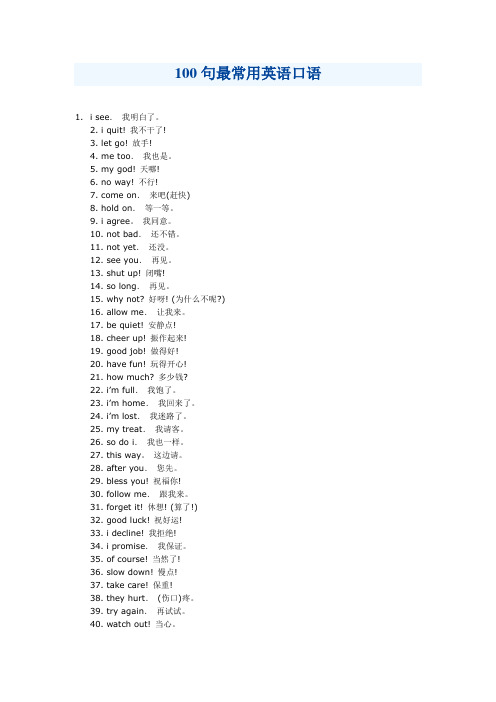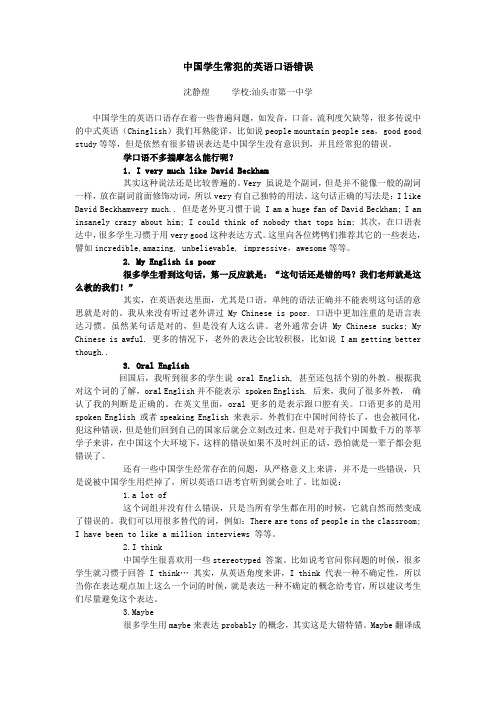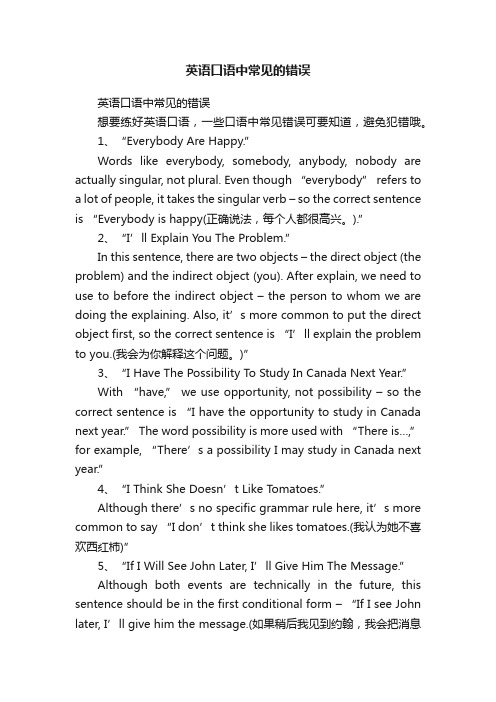你容易犯错的英语口语
最易犯错的口语句型

现在几点了?what time is it now?——英文中的时态已明确要问的时间是现在,因此表时间概念的词没有必要。
What time is it, please? 或How are we doing for time?(此句再有时间限制的时候特别合适)这是我的爱人。
This is my lover.——lover是指恋人、情妇、情夫等,暗指有性关系,因此需慎用。
This is my boyfriend/girlfriend/husband/wife…这个价格对我挺合适的。
The price is suitable for me.——suitable意为合适、相配,通常指与某人的意图、身份相符,或与某人所处的环境相符,可以以否定形式出现在告示或通知上。
The price is right for me.这个用英语怎么说?How to say this in English?——英文中,how to say 包含的言外之意是―这件事是难以启齿的‖、―这件事是不好表达的‖、―不知道用什么恰当的方式表达下面的内容‖。
我怎么说呢(how do I put it?/what should I say?),说不出话来(I don’t know what to say)。
How do you say this in English? 或what do you call this in English?麦克把他女朋友甩了。
Mike broke up with his girlfriend.——此句不能表明谁提出的。
应用dump(倾倒垃圾)表与某人结束恋爱关系。
Mike dumped his girlfriend.6.①烈酒可以用strong来修饰,此外strong还可以表示咖啡很浓。
②sth has grown on sb—某人开始喜欢……了。
③外国人在酒和一日三餐上分得很清。
④interfere with—打扰;interfere in—干涉7.你是做什么工作的?What’s your job?——如果对方刚失业,这样问就会很尴尬。
中国人最易犯错的30句英语口语

中国人最易犯错的30句英语口语1. I very like itI like it very much.2. 这个价格对我挺合适的。
The price is very suitable for me.The price is right.Note:suitable(合适的、相配的)最常见的用法是以否定的形式出现在告示或通知上,如:下列节目儿童不宜。
The followingprogramme is not suitable for children在这组句子中用后面的说法会更合适。
3. 你是做什么工作的呢?What’s your job?Are you working at the moment?Note:what’s yourjob这种说法难道也有毛病吗?是的。
因为如果您的谈话对象刚刚失业,如此直接的问法会让对方有失面子,所以您要问:目前您是在上班吗?Are you workingat the moment?接下来您才问:目前您在哪儿工作呢?Where are you working these days?或者您从事哪个行业呢?Whatline of work are you in?顺带说一下,回答这类问题时不妨说得具体一点,不要只是说经理或者秘书4. 用英语怎么说?How to say?How do you say this in English?Note:How to say是在中国最为泛滥成灾的中国式英语之一,这决不是地道的英语说法。
同样的句子有:请问这个词如何拼写?How do youspell that please?请问这个单词怎么读?How do you pronounce this word?5. 明天我有事情要做。
I have something to do tomorrow?Sorry but I am tied up all day tomorrow.用I have something todo来表示您很忙,这也完全是中国式的说法。
英语口语中常见的错误

英语口语中常见的错误英语作为一门全球通用的语言,在现代交流中扮演着重要的角色。
然而,由于不同语言之间的差异以及学习者的个人特点,很容易出现一些常见的错误。
在本文中,我将介绍几个英语口语中常见的错误,并给出相应的纠正方法。
首先,一个常见的错误是直译。
很多学习者在翻译中文到英文时,会按照中文的语法结构进行直接翻译,从而导致语句不通顺或语法错误。
例如,直译中文的习惯用语“一劳永逸”为“one tired forever”,这样的翻译是错误的。
正确的表达应为“once and for all”。
针对这个问题,学习者可以通过积累英语习惯用语和固定短语,以及阅读和听力训练来提高对英语表达的理解和运用能力。
其次,很多学习者在使用冠词时容易出错。
英语中的冠词使用相对复杂,常会产生困惑。
例如,很多学习者会在使用不可数名词时加上冠词,例如说“I want a informations”而不是“I want information”。
另外,有些学习者也容易忽略在可数名词前使用冠词的规则,例如说“she is teacher”而不是“she is a teacher”。
为了纠正这个错误,学习者可以通过背诵常见的可数和不可数名词的用法、带有冠词的固定搭配,以及多做练习和模仿来提高使用冠词的准确性。
此外,学习者在使用时态时也容易犯错。
英语的时态体系相对复杂,常常会让学习者感到困惑。
例如,学习者会经常混淆过去时和现在完成时的用法,说出类似“I have been to Paris last year”这样的错误句子。
正确的表达应为“I went to Paris last year”。
为了避免这种错误,学习者应该充分理解各个时态的用法,并通过大量的阅读和口语练习来提高时态的准确使用。
此外,很多学习者在使用动词时容易混淆不同的动词短语。
例如,许多学习者会混淆常见的交际动词短语,如“turn on/off”、“pick up”和“put down”。
英语口语100条

1. Never say die.永不言败。
2.Never too old to learn, never too late to turn.亡羊补牢,为时未晚。
3.New wine in old bottles.旧瓶装新酒。
4.No cross, no crown.不经历风雨,怎么见彩虹。
5.No garden without its weeds.没有不长草的园子。
6.No living man all things can.世上没有万事通。
7.No man can do two things at once.一心不可二用。
8.No man is born wise or learned.没有生而知之者。
9.No man is content.人心不足蛇吞象。
10.No man is wise at all times.聪明一世,糊涂一时。
11.None are so blind as those who won't see.视而不见。
12.None are so deaf as those who won't hear.充耳不闻。
13.No news is good news.没有消息就是好消息。
14.No one can call back yesterday.昨日不会重现。
15.No pains, no gains.没有付出就没有收获。
16.No pleasure without pain.没有苦就没有乐。
17.No rose without a thorn.没有不带刺的玫瑰。
18.No sweet without sweat.先苦后甜。
19.No smoke without fire.无风不起浪。
20.Nothing brave, nothing have.不入虎穴,焉得虎子。
21.Nothing dries sooner than a tear.眼泪干得最快。
22.Nothing in the world is difficult for one who sets his mind to it.世上无难事,只怕有心人。
100句最好用英语口语

100句最常用英语口语1.i see.我明白了。
2. i quit! 我不干了!3. let go! 放手!4. me too.我也是。
5. my god! 天哪!6. no way! 不行!7. come on.来吧(赶快)8. hold on.等一等。
9. i agree。
我同意。
10. not bad.还不错。
11. not yet.还没。
12. see you.再见。
13. shut up! 闭嘴!14. so long.再见。
15. why not? 好呀! (为什么不呢?)16. allow me.让我来。
17. be quiet! 安静点!18. cheer up! 振作起来!19. good job! 做得好!20. have fun! 玩得开心!21. how much? 多少钱?22. i’m full.我饱了。
23. i’m home.我回来了。
24. i’m lost.我迷路了。
25. my treat.我请客。
26. so do i.我也一样。
27. this way。
这边请。
28. after you.您先。
29. bless you! 祝福你!30. follow me.跟我来。
31. forget it! 休想! (算了!)32. good luck! 祝好运!33. i decline! 我拒绝!34. i promise.我保证。
35. of course! 当然了!36. slow down! 慢点!37. take care! 保重!38. they hurt.(伤口)疼。
39. try again.再试试。
40. watch out! 当心。
41. what’s up? 有什么事吗?42. be careful! 注意!43. bottoms up! 干杯(见底)!44. don’t move! 不许动!45. guess what? 猜猜看?46. i doubt it 我怀疑。
英语翻译易犯错误的50个例子

翻译易错的50个例子1. cabinet photograph例句:Is the cabinet photograph well taken?误译:这张全体内阁成员的合影拍得好吗?原意:这张六英寸照片拍得好吗?说明:cabinet photograph (合成名词) 是"六英寸照片"之意。
2. cakes and ale例句:She fully enjoyed cakes and ale。
误译:她充分地享用了蛋糕和啤酒。
原意:她尽享了人生乐趣。
说明:cakes and ale 意为"人生乐趣(事)". (此语出自莎士比亚著作Twelfth Night<<第十二夜>>)。
3. call例句:He has no call to flare up。
误译:他没有发怒大叫。
原意:他没有必要发怒。
说明:本例的call (名词),意为"必要","理由". 作此解时一般用于否定句和疑问句。
4. call one names例句:My grandpa told me not to call him names。
误译:我爷爷告诉我不要叫他的名字。
原意:我爷爷叫我不要骂他。
说明:call one names 意为"辱骂某人",用于口语. 值得注意的是,one一定要用宾格,而不是所有格,即不是one's."names" 一定是复数"names", 否则就不是此意. 如上例,若该成Mygrandpa told me notto callhis name. 则是"我爷爷叫我不要叫他的名字". call one's name中的name根据情况,可用单数和复数。
5. can例句:Buy up all the pineapples! We can can them。
中国学生常犯的英语口语错误

中国学生常犯的英语口语错误沈静煌学校:汕头市第一中学中国学生的英语口语存在着一些普遍问题,如发音,口音,流利度欠缺等,很多传说中的中式英语(Chinglish)我们耳熟能详,比如说people mountain people sea,good good study等等,但是依然有很多错误表达是中国学生没有意识到,并且经常犯的错误。
学口语不多揣摩怎么能行呢?1.I very much like David Beckham其实这种说法还是比较普遍的。
Very 虽说是个副词,但是并不能像一般的副词一样,放在副词前面修饰动词,所以very有自己独特的用法。
这句话正确的写法是:I like David Beckhamvery much.. 但是老外更习惯于说 I am a huge fan of David Beckham; I am insanely crazy about him; I could think of nobody that tops him; 其次,在口语表达中,很多学生习惯于用very good这种表达方式。
这里向各位烤鸭们推荐其它的一些表达,譬如incredible,amazing, unbelievable, impressive,awesome等等。
2. My English is poor很多学生看到这句话,第一反应就是:“这句话还是错的吗?我们老师就是这么教的我们!”其实,在英语表达里面,尤其是口语,单纯的语法正确并不能表明这句话的意思就是对的。
我从来没有听过老外讲过My Chinese is poor. 口语中更加注重的是语言表达习惯。
虽然某句话是对的,但是没有人这么讲。
老外通常会讲 My Chinese sucks; My Chinese is awful. 更多的情况下,老外的表达会比较积极,比如说 I am getting better though..3. Oral English回国后,我听到很多的学生说oral English, 甚至还包括个别的外教。
英语口语中常见的错误

英语口语中常见的错误英语口语中常见的错误想要练好英语口语,一些口语中常见错误可要知道,避免犯错哦。
1、“Everybody Are Happy.”Words like everybody, somebody, anybody, nobody are actually singular, not plural. Even though “everybody” refers to a lot of people, it takes the singular verb – so the correct sentence is “Everybody is happy(正确说法,每个人都很高兴。
).”2、“I’ll Explain You The Problem.”In this sentence, there are two objects – the direct object (the problem) and the indirect object (you). After explain, we need to use to before the indirect object – the person to whom we are doing the explaining. Also, it’s more common to put the direct object first, so the correct sentence is “I’ll explain the problem to you.(我会为你解释这个问题。
)”3、“I Have The Possibility To Study In Canada Next Year.”With “have,” we use opportunity, not possibility – so the correct sentence is “I have the opportunity to study in Canada next year.” The word possibility is more used with “There is…,” for example, “There’s a pos sibility I may study in Canada next year.”4、“I Think She Doesn’t Like Tomatoes.”Although there’s no specific grammar rule here, it’s more common to say “I don’t think she likes tomatoes.(我认为她不喜欢西红柿)”5、“If I Will See John Later, I’ll Give Him The Message.”Although both events are technically in the future, this sentence should be in the first conditional form –“If I see John later, I’ll give him the message.(如果稍后我见到约翰,我会把消息转告给他的)”6、“Do You Want That I Make Breakfast?”“That” is not normally used after “want.” The correct sentence is: “Do you want me to make breakfast?(你想让我做早餐吗?)”7、“I’m Thinking To Buy A New Car.”“To + infinitive” is not used after “think,” so the correct sentence would be: “I’m thinking of buying a new car” or “I’m thinking about buyi ng a new car.(我正考虑买辆新车)”8、“They Enjoyed The Baseball Game Despite Of The Rain.”“Despite” and “in spite of” mean the same thing, and many English learners confuse them. After “despite,” we never use “of.” The correct sentence would be “They enjoyed the baseball game despite the rain” or “They enjoyed the baseball game in spite of the rain.”9、“My Ten-Years-Old Daughter Loves To Dance.”When an age comes after “is,” then you say “years old”: “My daughter is ten years old.” But when an age comes before the person (or object) as an adjective, then you say year, not years –“My ten-year-old daughter loves to dance.”10、“Our House Is Near To The Beach.”“Near” and “close to” mean the same thing, but “to” is never used after “near.” The correct sentence is “Our house is near the beach” or “Our house is close to the beach.”11、“I Like Very Much Soccer.”We don’t normally put “very much” between a verb (like) and its object (soccer). The correct sentence would be, “I like soccer very much.” However, in spoken Engl ish, it would probably be more common to say “I like soccer a lot” or “I really like soccer.”12、“Gary Gave To Joan The Keys.”Like “explain” in the example above, “give” has two objects –the indirect object (Joan) and the direct object (the keys). We can say this sentence two ways: “Gary gave Joan the keys” or “Gary gave the keys to Joan.”13、“She Asked Me Where Do I Work.”This is one of the most difficult parts of English – reported speech(间接引语). In reported questions, we do not use the auxiliary verb do/does/did –so the correct sentence is, “She asked me where I work.”14、“They Left Without Say Goodbye.”When you use a verb after conjunctions and prepositions like after, before, since, when, while, without, instead of, and in spite of, it is generally in the -ing form. So the correct sentence is “They left without saying goodbye.”15、“I Need To Finish This Project Until Friday.”Use until to talk about a situation that will continue up to a certain moment, for example: “I’m staying in the city until June.” Use by to talk about a single action or event that will happen before a future moment. By is often used with deadlines, so the correct sentence is, “I need to finish this project by Friday.”【英语口语中常见的错误】。
- 1、下载文档前请自行甄别文档内容的完整性,平台不提供额外的编辑、内容补充、找答案等附加服务。
- 2、"仅部分预览"的文档,不可在线预览部分如存在完整性等问题,可反馈申请退款(可完整预览的文档不适用该条件!)。
- 3、如文档侵犯您的权益,请联系客服反馈,我们会尽快为您处理(人工客服工作时间:9:00-18:30)。
你容易犯错的英语口语
1. The house is really A-1.
(误译)那间房子的门牌确实是A-1号。
(正译)那间房子确实是一流的。
2.He bought a baker's dozen of biscuits。
(误译)他买了面包师做的12块饼干。
(正译)他买了13块饼干。
3.A bull of Bashan woke the sleeping child with his noise。
(误译)贝兴的一头公牛弄醒了那个酣睡的孩子。
(正译)一个大嗓门的人把那个酣睡的孩子吵醒了。
4.He was a cat in the pan。
(误译)他是盘子中的一只猫。
(正译)他是个叛徒。
5.A cat may look at a king。
(误译)一只猫都可以看到国王。
(正译)小人物也该有同等权利。
6.Even a hair of dog didn't make him feel better。
(误译)即使一根狗毛也不会使他觉得好些。
(正译)即使是再喝解宿醉的一杯酒,也不会使他觉得好些。
7.Is he a Jonah?
(误译)他就是叫约拿吗?
(正译)他是带来厄运的人吗?
8.Jim is fond of a leap in the dark。
(误译)吉姆喜欢在黑暗处跳跃。
(正译)吉姆喜欢冒险行事。
9.A little bird told me the news。
(误译)一只小鸟将此消息告诉我。
(正译)消息灵通的人士将此消息告诉我。
10.Angela is a man of a woman。
(误译)安吉拉是个有妇之夫。
(正译)安吉拉是个像男人的女人。
11.Nellie is a man of his word。
(误译)内莉是他所说的那个人。
(正译)内莉是个守信用的人。
12.He paid a matter of 1000 yuan。
(误译)他付了1000元的货物账。
(正译)他大约付了1000元。
13.It is a nice kettle of fish! I have a stomachache。
(误译)这是一锅好鱼,(可惜)我胃痛。
(正译)真糟糕,我胃痛了。
14.She is a nose of wax。
(误译)她的鼻子是腊制的义鼻。
(正译)她没有主见。
15.Glen spent a small fortune on a tour round the world。
(误译)格伦花了一笔小钱周游世界。
(正译)格伦花了巨资周游世界。
16.He is very glad that his wife's going to get a visit from the stork。
(误译)他为她的妻子将获得参观鹳鸟的机会感到非常高兴。
(正译)他为妻子即将生孩子感到非常高兴。
17.Archibaid was a whale at fishing in his young days。
(误译)阿奇比德年轻时捕鱼捕到了一条鲸鱼。
(正译)阿奇比德年轻时擅长捕鱼。
18.Is there a world of difference between Kenneth and Louie? (误译)肯尼斯和路易是生活在不同的世界吗?
(正译)肯尼斯和路易之间有极大的不同吗?
19.The ABC hopes to settle in China。
(误译)那个美国广播公司希望在中国设立公司。
(误译)那个在美国土生土长的华裔希望在中国定居。
20.Bruce was taken up above the salt。
(误译)布鲁斯坐在盐上。
(正译)布鲁斯被请坐上席。
21.These commercial transactions are aboveboard。
(误译)这些商业交易是在船上进行的。
(正译)这些商业交易是光明磊落的。
22.Colin is absent in Shanghai。
(误译)科林现在不在上海。
(正译)克林去上海了,不在这里。
23.I only use Accent for soup。
(误译)我只须强调做汤。
(正译)我只在做汤时加味精。
24.We should call him Adam。
(误译)我们应该把他叫做亚当。
(正译)我们应该叫他的名字。
25.Donna can sing after a fashion。
(误译)唐纳能唱时代歌曲。
(正译)唐纳多少能唱一些歌。
26.Her opinion is all my eye。
(误译)她的主张也完全是我的观点。
(正译)她的主张是胡说八道。
27.Bess ate all of six fruit cakes。
(误译)贝丝吃光了所有的六块水果蛋糕。
(正译)贝丝足足吃了六块蛋糕。
28.All the world and his wife were so kind to Marlin。
(误译)全世界和他的妻子都对马林这么好。
(正译)人人都对马林这么好。
29.Mr. Smith is an American China trader。
(误译)史密斯先生是一个美籍华裔商人。
(正译)史密斯先生是一个做对华贸易的美国商人。
30.These youths are full of animal spirits。
(误译)这些年轻人充满动物精神。
(正译)这些年轻人充满活力。
31.Jim is discussing anything under the sun with Paula。
(误译)吉姆和葆拉在阳光下讨论问题。
(正译)吉姆与葆拉海阔天空,无所不谈。
32.Why is Merry like April weather?
(误译)为什么梅里好像四月天气?
(正译)为什么梅里喜怒无常?
33.The bank is open around the clock。
(误译)那家银行准时营业。
(正译)那家银行24小时营业。
34.Bath Festival is just around the corner。
(误译)巴斯音乐节就在那个拐角周围举行。
(正译)巴斯音乐节即将到来。
35.The child is as good as gold。
(误译)这个孩子像黄金那样宝贵。
(正译)这个孩子很乖。
36.Mr. Norman will help you, as likely as not。
(误译)诺曼先生不可能帮助你。
(正译)诺曼先生很可能会帮助你。
37.I am as old again as you。
(误译)我又像你那样老了。
(正译)我的年纪比你大一倍。
38.Tom asked after you。
(误译)汤姆在后面叫你。
(正译)汤姆问候你。
39.The escaped prisoner is still at large。
(误译)那个逃犯罪行仍然很大。
(正译)那个逃犯仍逍遥法外。
40.Gary spoke at length about the bridge。
(误译)加里讲述了那座桥的长度。
(正译)吉里详细地讲述了那座桥的事。
41.Gordon is at once modest and clever。
(误译)戈等立即显得聪明和谦逊。
(正译)戈登即聪明又谦逊。
42.Why did Berk have a good laugh at Allan's expense? (误译)为什么伯克大笑艾伦的花费?
(正译)为什么伯克对艾伦大加嘲笑?
43.Carrie never changes her mind at pleasure。
(误译)卡里从来不会高高兴兴地改变主意。
(正译)卡里从不随意改变主意。
44.He has athlete's foot。
(误译)他的一只脚长得像运动员的脚一样。
(正译)他患香港脚。
45.Your august father is my friend。
(误译)你父亲八月份成为我的朋友。
(正译)令尊是我的朋友。
